Managing customer relationships is one of the biggest challenges for any Shopify store. Whether you’re running a small e-commerce business or managing a medium-sized brand, having the right CRM (Customer Relationship Management) system can make all the difference. It helps you manage customer data, track interactions, and streamline marketing and sales processes—all while improving customer satisfaction.
This article highlights the 9 best CRMs for Shopify that can help boost your e-commerce success in 2024. These CRM tools are designed to integrate seamlessly with best Shopify, ensuring smooth data management, sales automation, and personalized communication.
If you’re tired of juggling spreadsheets or struggling to track customer interactions, this guide will introduce you to CRM software that fits your business needs. Plus, we’ll share key features like marketing automation tools, customer segmentation, and advanced analytics to help you make an informed choice.
Stay with us to discover how these CRMs can transform your best Shopify store into a sales powerhouse.
Why Your Shopify Store Needs a CRM
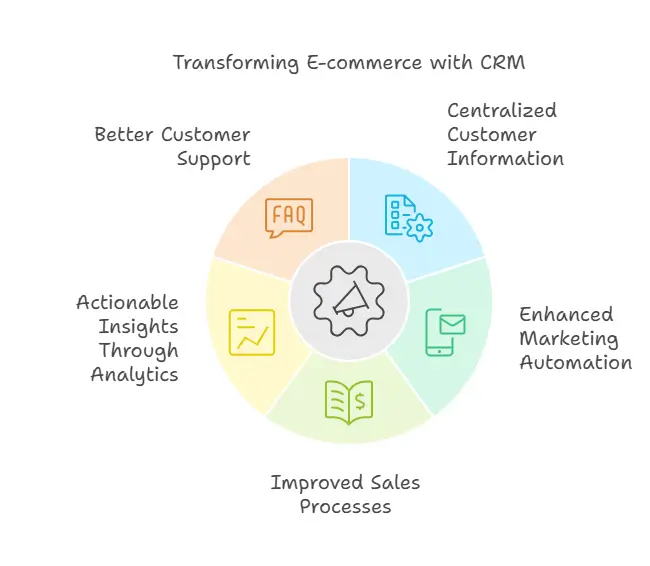
Running a successful best Shopify store isn’t just about attracting new customers. It’s also about managing existing ones, creating personalized communication, and improving overall customer satisfaction. This is where a robust CRM system comes into play.
A best shopify CRM helps e-commerce businesses streamline customer data management and ensure smooth customer interactions. It consolidates all your customer data in one place, from purchase history to contact details, so you can analyze customer behavior and create targeted marketing campaigns.
Here are some of the ways a CRM system can transform your e-commerce store:
1. Centralized Customer Information
With a CRM system, you can track all customer interactions, purchases, and preferences in one platform. This makes it easy for sales teams and customer service teams to access accurate and updated information, leading to better decision-making.
2. Enhanced Marketing Automation
Modern CRM tools come equipped with marketing automation features, such as email marketing and personalized recommendations. These tools help create efficient marketing campaigns and improve customer engagement.
3. Improved Sales Processes
By integrating CRM software with your Shopify store, you can optimize sales processes, track leads, and use sales forecasting to plan your next steps. CRMs also help sales reps stay on top of customer needs, improving conversions and increasing sales.
4. Actionable Insights Through Analytics
Most CRMs include analytics tools to track metrics like customer segments, retention rates, and marketing performance. These insights help e-commerce businesses refine their marketing and sales processes to better target their audience.
5. Better Customer Support
Strong customer relationships are built on excellent support. CRMs with customer service capabilities ensure your team can respond quickly and effectively, leading to happier, more loyal customers.
Integrating a CRM with your Shopify store isn’t just about managing data—it’s about transforming your ecommerce business into a customer-centric operation. Whether you’re just starting out or scaling your store, the right CRM tools can save time, reduce errors, and help your team focus on what matters most: delivering an exceptional customer experience.
Key Features to Look for in a Shopify CRM
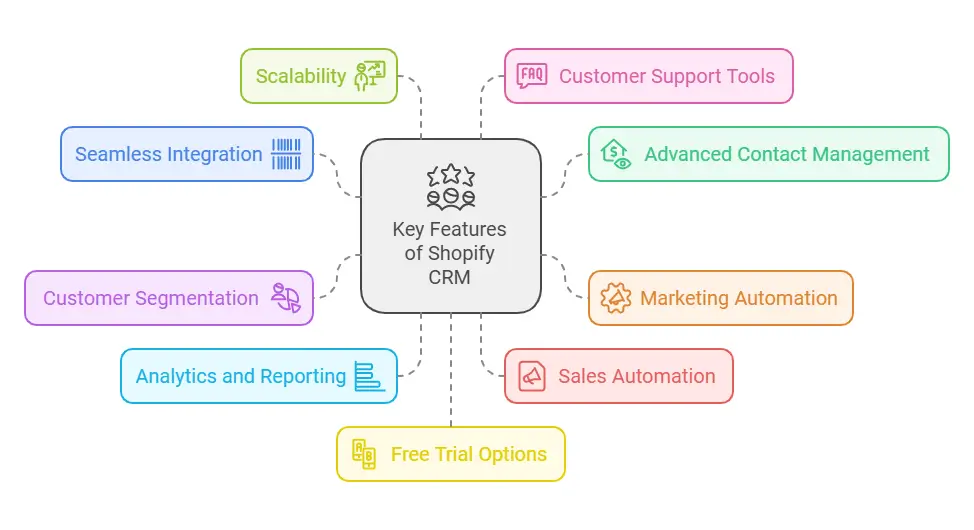
Choosing the right CRM for Shopify can feel overwhelming, especially with so many options available. To make it easier, focus on the features that align with your business operations and help you achieve your goals. Here are the must-have features to look for when selecting a CRM system for your Shopify store:
1. Seamless Shopify Integration
A great Shopify CRM should integrate effortlessly with your ecommerce platform, syncing all your customer data automatically. Look for tools with Shopify CRM integrations that ensure real-time updates for purchases, customer interactions, and marketing efforts.
2. Advanced Contact Management Features
Managing contacts effectively is crucial for building strong customer relationships. Your CRM should offer robust contact management capabilities, including tracking customer information, segmenting customers based on purchase history, and organizing customer segments for personalized communication.
3. Marketing Automation Tools
Automating repetitive tasks like email campaigns and social media scheduling can save you time and boost efficiency. A reliable CRM should include marketing automation features to help you create and execute targeted marketing campaigns with ease.
4. Customer Segmentation and Personalization
Understanding your audience is key to driving engagement. Look for a CRM that offers customer segmentation, allowing you to group customers based on preferences, behavior, and demographics. This makes it easier to create targeted marketing campaigns and improve customer engagement.
5. Analytics and Reporting
Access to actionable insights is a game-changer for e-commerce businesses. The CRM you choose should provide analytics tools to track sales performance, marketing ROI, and customer behavior. These reports help optimize business processes and identify growth opportunities.
6. Sales Automation
Simplify your sales processes with features like lead tracking, pipeline management, and sales forecasting. Sales automation ensures your sales professionals spend more time closing deals and less time on manual tasks.
7. Scalability
As your ecommerce business grows, your CRM should grow with it. Choose a tool that can handle increasing volumes of customer data, support larger customer segments, and adapt to your expanding needs.
8. Customer Support Tools
Your customer service teams need tools to resolve issues quickly and efficiently. Features like ticketing systems, chat support, and automated responses ensure a seamless customer experience and strengthen customer relationships.
9. Free Trial Options
Before committing to a CRM, it’s helpful to try it out. Many platforms offer a 14-day free trial or similar, giving you time to test its features, usability, and integration with your Shopify store.
By focusing on these features, you’ll find a CRM solution that fits your Shopify store’s unique needs and empowers your marketing and sales processes.
9 Best CRMs for Shopify in 2024
Here’s a detailed look at the 9 best CRMs for Shopify. Each of these tools offers unique features that can help e-commerce businesses improve customer engagement, streamline business operations, and boost sales processes.
1. HubSpot CRM
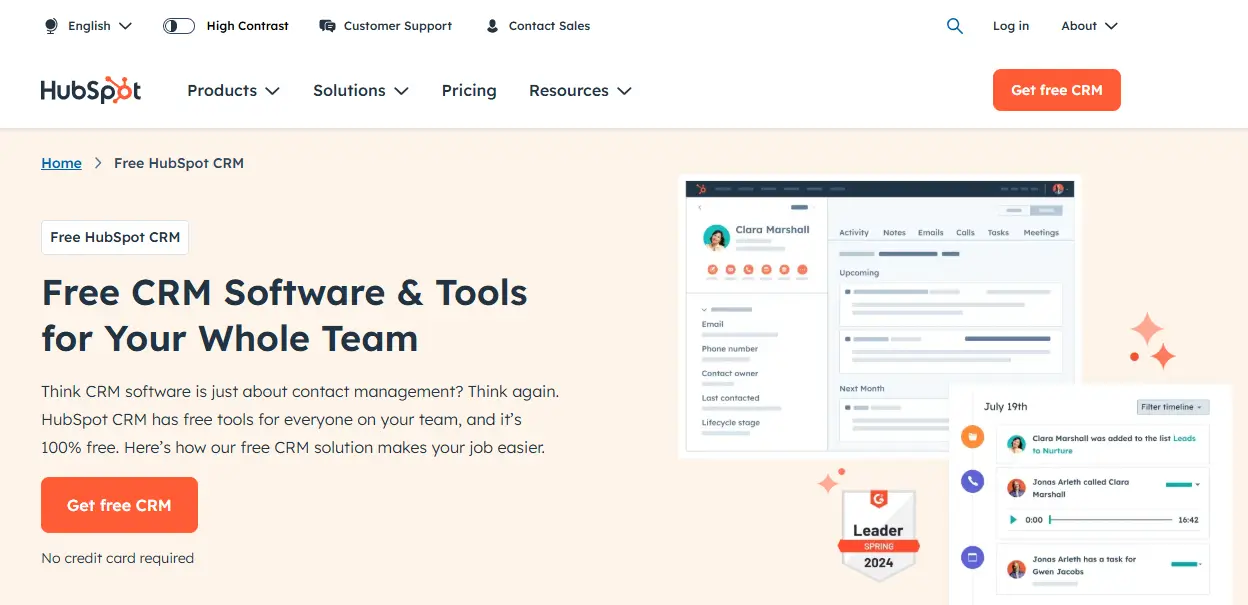
HubSpot CRM is one of the most popular options for Shopify users, offering a wide range of tools to manage customer relationships and automate workflows.
Key Features:
- Seamless Shopify integration to sync all customer data in real time.
- Built-in marketing automation tools for email marketing and lead nurturing.
- Advanced analytics tools for tracking sales and customer behavior.
- Robust contact management with personalization options for targeted marketing campaigns.
Pros:
- User-friendly interface with minimal learning curve.
- Free plan available for basic features.
- Strong analytics and reporting capabilities.
Cons:
- Advanced features can become expensive as you scale.
- Limited customization on lower-tier plans.
Best For: Medium-sized e-commerce businesses looking for scalability.
Pricing: Free basic plan; paid plans start at $45 per user/month.
Free Trial: Yes, offers a 14-day free trial.
2. Zoho CRM

Zoho CRM is known for its flexibility and affordability, making it a great option for small to medium-sized businesses.
Key Features:
- Powerful customer segmentation tools to organize Shopify customer data.
- Sales automation features for tracking leads and managing pipelines.
- Integration with Shopify to streamline customer interactions and marketing efforts.
- Customizable workflows for improved business processes.
Pros:
- Affordable pricing with comprehensive features.
- Excellent customization options for small businesses.
- Integrates with other Zoho apps for a seamless ecosystem.
Cons:
- Interface can feel cluttered for beginners.
- Advanced automation tools require higher-tier plans.
Best For: Small businesses on a budget.
Pricing: Plans start at $14 per user/month.
Free Trial: Yes, offers a 14-day free trial.
3. Salesforce CRM
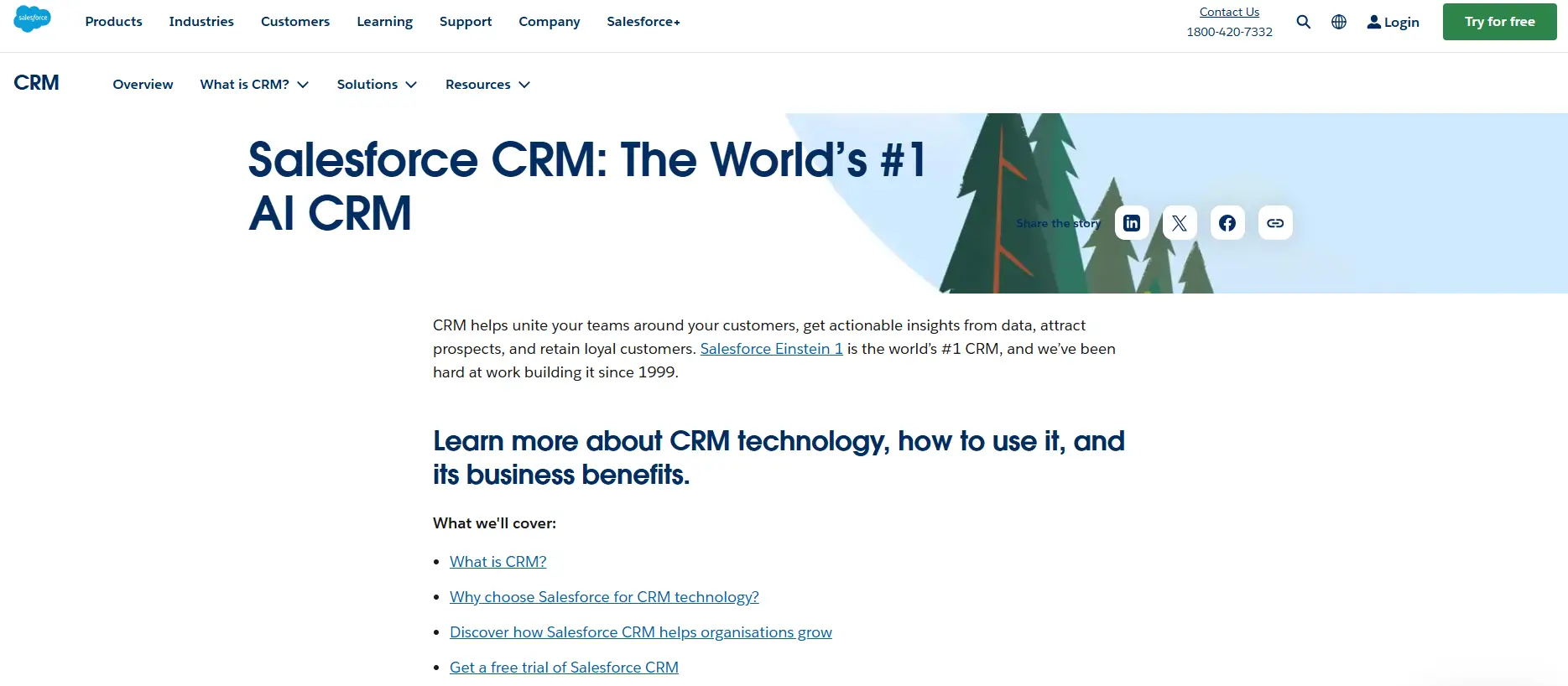
Salesforce is a leading CRM software offering enterprise-level features, perfect for growing businesses that need robust solutions.
Key Features:
- Advanced customer data management for handling large datasets.
- AI-driven insights to enhance sales forecasting and marketing campaigns.
- Comprehensive Shopify integration for syncing purchase history and customer details.
- Scalability to handle growing e-commerce stores.
Pros:
- Extremely powerful and scalable for businesses of all sizes.
- Advanced analytics and reporting for in-depth insights.
- Large app marketplace for added functionality.
Cons:
- Steeper learning curve for new users.
- Higher cost compared to most CRMs.
Best For: Large e-commerce brands with complex needs.
Pricing: Plans start at $25 per user/month.
Free Trial: Yes, offers a 30-day free trial.
4. Pipedrive

Pipedrive focuses on sales and pipeline management, making it a great choice for businesses aiming to optimize their sales processes.
Key Features:
- Visual pipeline tracking for easy lead management.
- Sales automation features to reduce manual tasks for sales reps.
- Shopify CRM integration to sync leads and customer data.
- Customizable fields to track customer segments and preferences.
Pros:
- Easy-to-use interface with visual workflows.
- Focuses heavily on sales optimization and pipeline tracking.
- Affordable pricing for small teams.
Cons:
- Limited marketing automation features compared to competitors.
- Not ideal for businesses needing comprehensive customer service tools.
Best For: E-commerce stores with a strong focus on sales.
Pricing: Plans start at $14.90 per user/month.
Free Trial: Yes, offers a 14-day free trial.
5. ActiveCampaign

ActiveCampaign combines email marketing, marketing automation, and CRM features to deliver an all-in-one solution for Shopify users.
Key Features:
- Tools to automate e-commerce campaigns for personalized communication.
- Integration with Shopify for syncing customer behavior and purchase history.
- Advanced customer segmentation capabilities for improved targeting.
- Customizable workflows for managing marketing and sales processes.
Pros:
- Excellent email marketing and automation features.
- Strong focus on customer engagement and retention.
- Affordable pricing for its feature set.
Cons:
- Interface can be overwhelming for beginners.
- CRM features are less robust compared to standalone solutions.
Best For: E-commerce businesses that prioritize email marketing and automation.
Pricing: Plans start at $29 per user/month.
Free Trial: Yes, offers a 14-day free trial.
6. Metrilo
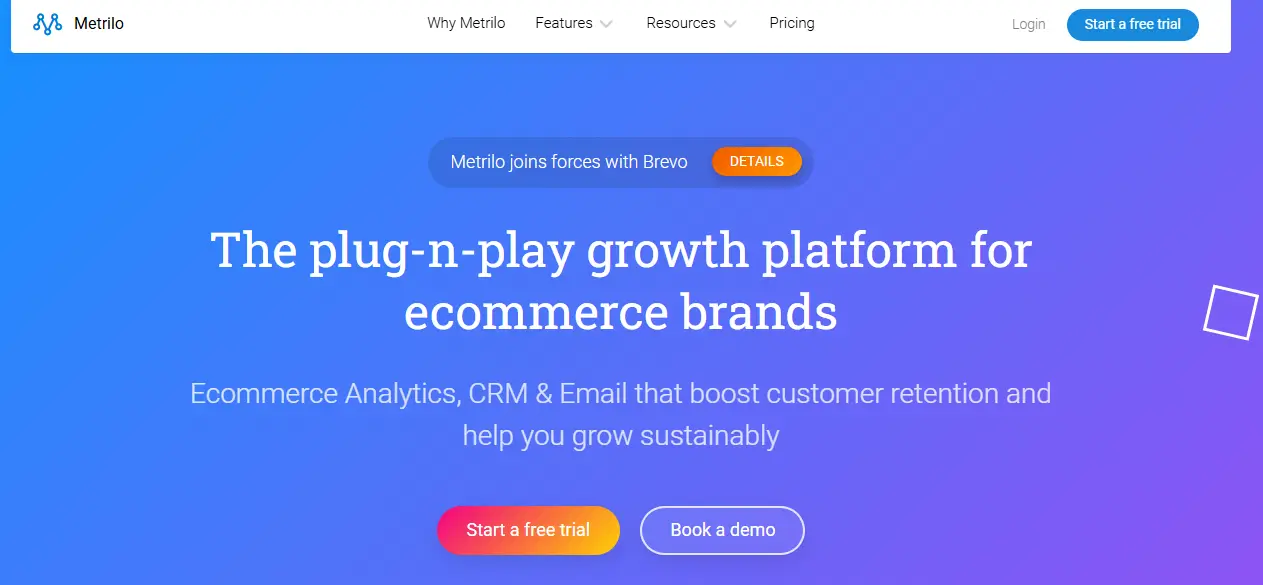
Metrilo is specifically designed for e-commerce stores, making it a perfect fit for Shopify businesses focused on analytics and customer engagement.
Key Features:
- Real-time tracking of customer behavior and sales performance.
- Built-in email marketing and campaign management tools.
- Detailed insights into customer segments for personalized communication.
- Seamless Shopify integration to sync purchase history and website activity.
Pros:
- Tailored for e-commerce businesses, ensuring niche features.
- Strong analytics tools for better decision-making.
- User-friendly interface with actionable reports.
Cons:
- Lacks some advanced CRM features like robust automation workflows.
- Pricing is higher compared to other CRMs with similar features.
Best For: Shopify stores prioritizing analytics and campaign performance.
Pricing: Starts at $119 per month (up to 5,000 customers).
Free Trial: Yes, offers a 14-day free trial.
7. Zendesk Sell
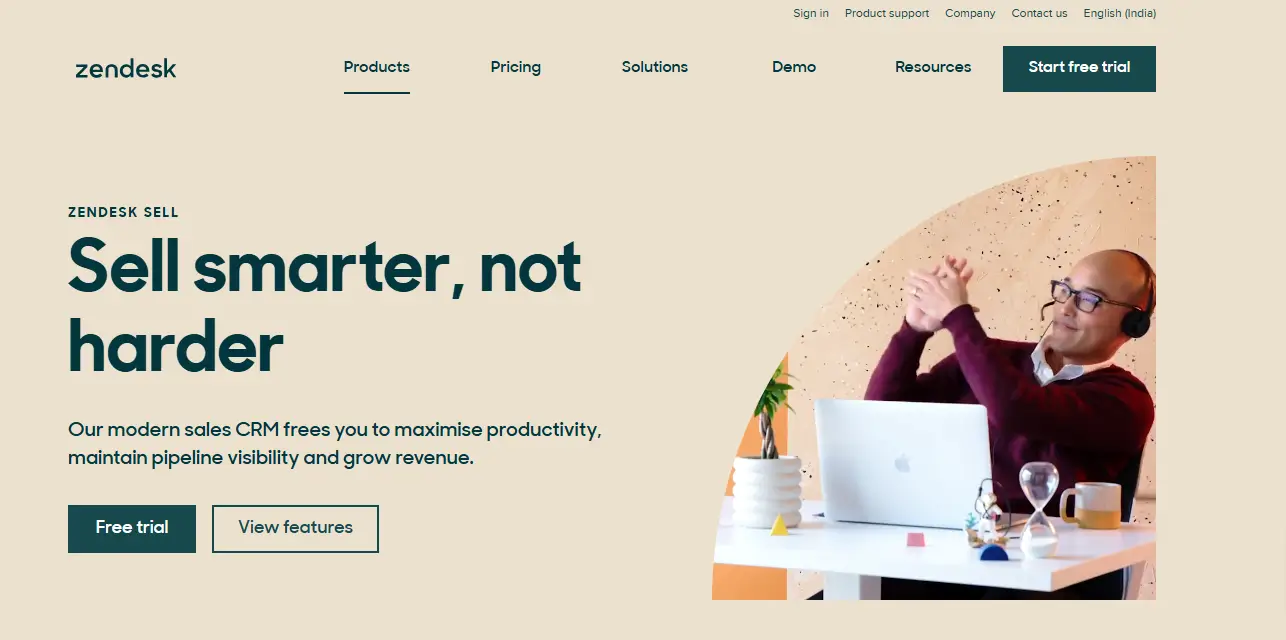
Zendesk Sell offers a CRM focused on improving sales processes and improve customer service capabilities.
Key Features:
- Tools to track and manage customer interactions across multiple channels.
- Strong focus on sales pipeline optimization with visual workflows.
- Integration with Shopify for syncing customer data and leads.
- Powerful collaboration tools for sales teams.
Pros:
- Easy integration with Zendesk Support for a seamless customer service experience.
- Intuitive interface for tracking and managing leads.
- Highly scalable for growing businesses.
Cons:
- Limited marketing automation features.
- Not ideal for businesses looking for advanced analytics.
Best For: Shopify stores focused on improving both sales and customer service.
Pricing: Plans start at $19 per user/month.
Free Trial: Yes, offers a 14-day free trial.
8. Bitrix24
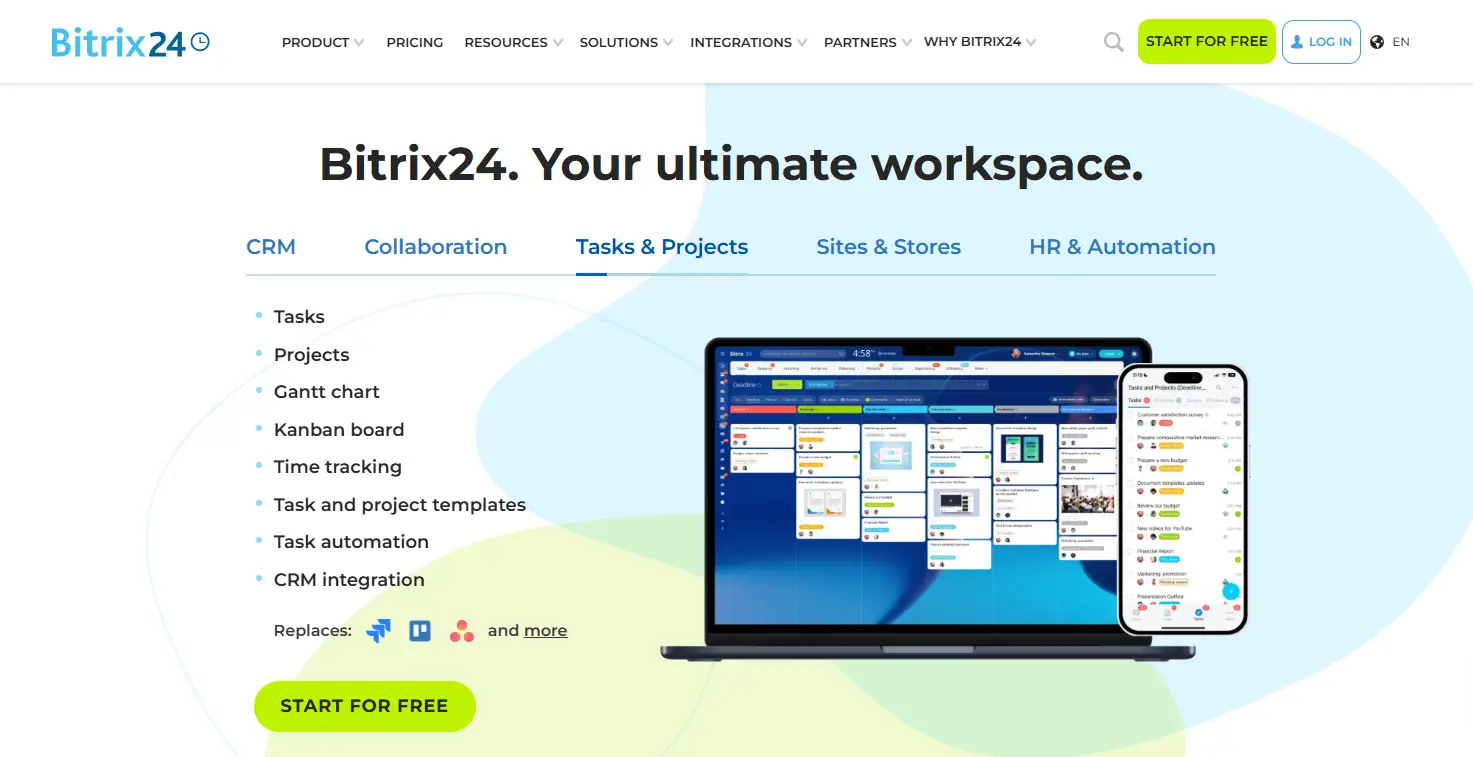
Bitrix24 is an all-in-one CRM system that combines sales, marketing, and project management tools, making it versatile for e-commerce stores.
Key Features:
- Comprehensive customer relationship management CRM features, including lead tracking and contact management.
- Built-in tools for email marketing and collaboration.
- Integration with Shopify for syncing customer data and managing business processes.
- Advanced communication tools like video calls and chat support.
Pros:
- Offers a free plan with generous features.
- Includes project management and team collaboration tools.
- Scalable for small to large businesses.
Cons:
- Interface can feel overwhelming for new users.
- Limited third-party integrations compared to competitors.
Best For: E-commerce businesses that want an all-in-one solution.
Pricing: Free plan available; paid plans start at $39 per month.
Free Trial: Yes, offers a 30-day free trial.
9. Agile CRM
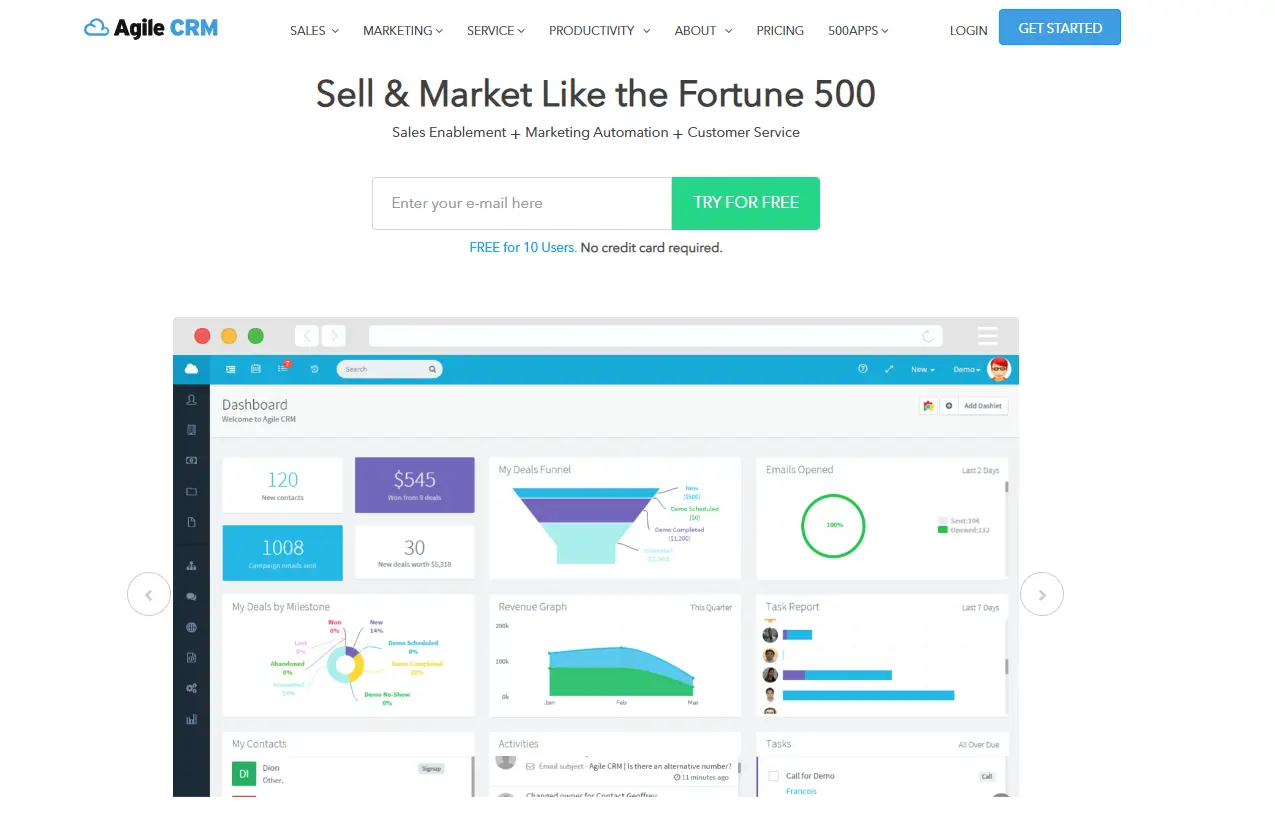
Agile CRM is a powerful tool for small and medium-sized e-commerce businesses, offering a balance of affordability and features.
Key Features:
- Strong marketing automation tools for creating and managing campaigns.
- Integration with Shopify to track customer data and interactions.
- Tools for sales automation, including deal tracking and appointment scheduling.
- Built-in analytics and reporting to optimize marketing efforts.
Pros:
- Affordable pricing with no compromise on core features.
- Ideal for startups and small businesses.
- Easy-to-use interface with quick setup.
Cons:
- Limited customization options for advanced users.
- Not as scalable for larger e-commerce brands.
Best For: Small Shopify stores looking for an affordable, beginner-friendly CRM.
Pricing: Free basic plan; paid plans start at $8.99 per user/month.
Free Trial: Yes, offers a 30-day free trial.
How to Choose the Right CRM for Your Shopify Store
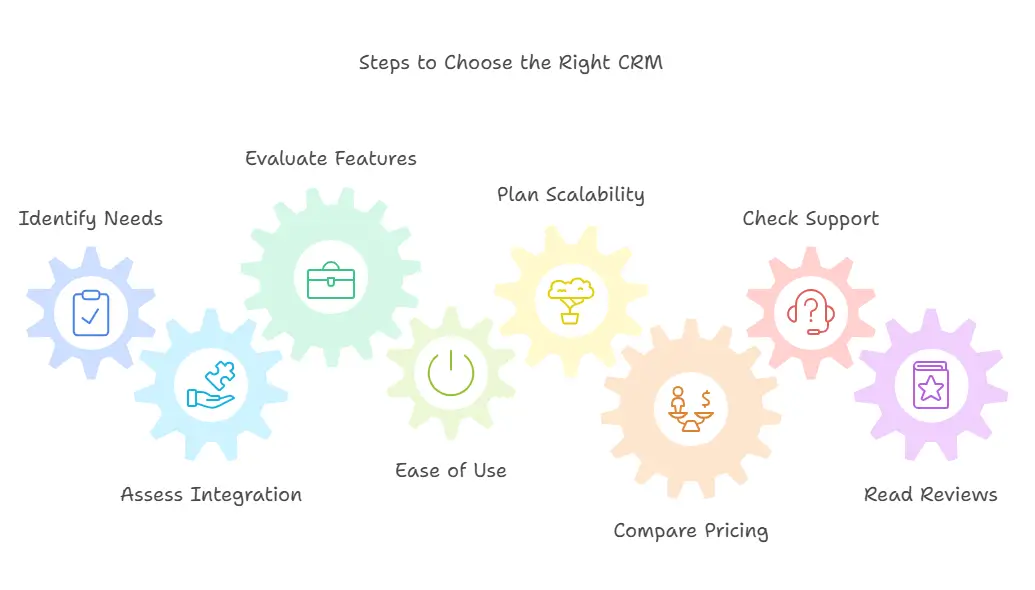
Finding the perfect CRM system for your Shopify store depends on your business needs, budget, and goals. With so many options available, here’s a step-by-step guide to help you decide:
1. Identify Your Business Needs
Before choosing a CRM, consider what your Shopify store needs most.
- Are you focused on improving customer relationships?
- Do you need robust marketing automation tools?
- Is your priority streamlining sales processes for your sales teams?
Understanding these goals will help you focus on features that truly matter.
2. Assess Integration Capabilities
Ensure the CRM offers seamless Shopify integration to sync your customer data and sales history automatically. A strong integration reduces manual data entry and ensures all your customer information stays up-to-date.
3. Evaluate Features That Drive Growth
Key features like customer segmentation, sales automation, and marketing campaigns should align with your objectives. For example:
- Use CRMs like HubSpot or Salesforce for advanced customer data management and analytics tools.
- Consider ActiveCampaign for automated email marketing and personalized communication.
4. Factor in Ease of Use
Your team needs to adapt quickly to the new system. CRMs like Pipedrive or Agile CRM are known for their simple interfaces, making them ideal for small teams or first-time users.
5. Plan for Scalability
If you’re expecting rapid growth, choose a CRM like Salesforce or Bitrix24 that can handle expanding customer segments, increasing sales, and growing teams without compromising performance.
6. Compare Pricing Options
CRMs come with a variety of pricing structures. Look for a tool that fits your budget but still meets your needs. Many CRMs offer a 14-day free trial or 30-day free trial, so take advantage of these to test out features.
7. Check Customer Support and Resources
Reliable customer support is crucial when you’re starting with a new system. CRMs like Zendesk Sell excel in customer service capabilities, while HubSpot offers extensive training resources and tutorials.
8. Read User Reviews
Online reviews and case studies provide real-world insights into how a CRM performs for Shopify businesses. Pay attention to feedback from similar-sized e-commerce stores.
Key Takeaway
The right CRM is one that matches your store’s specific needs and fits into your current business processes. Whether you’re running a small e-commerce store or managing a medium-sized brand, choosing a CRM like HubSpot, Zoho, or ActiveCampaign can help you:
- Manage customer data effectively.
- Automate marketing efforts and sales tasks.
- Improve customer satisfaction and increase sales.
FAQs
1. How does a CRM help my Shopify store?
A CRM for Shopify streamlines customer data management, improves customer relationships, and automates tasks like marketing and sales. It provides insights into customer behavior and helps create personalized communication to boost engagement and sales.
2. Can I integrate a CRM directly with Shopify?
Yes, many CRMs offer seamless Shopify integration, allowing you to sync purchase history, track customer interactions, and manage customer segments without manual effort. Examples include HubSpot, ActiveCampaign, and Metrilo.
3. What features should I look for in a Shopify CRM?
Key features include:
Shopify CRM integrations for real-time data syncing.
Marketing automation tools to create targeted marketing campaigns.
Analytics tools to track performance and insights.
Sales automation to streamline sales processes.
4. How much does a Shopify CRM cost?
Pricing varies by platform:
Affordable options like Zoho CRM and Agile CRM start at $8.99–$14 per user/month.
More advanced tools like HubSpot CRM and Salesforce CRM start at $25–$45 per user/month.
Some CRMs, like Bitrix24, offer free plans with limited features.
5. How do I know if a CRM is right for my e-commerce store?
Start with a free trial to explore features and usability. Focus on tools that simplify your marketing and sales processes, fit your budget, and provide excellent support for customer service teams.
6. Can CRMs help with customer segmentation?
Yes, most CRMs include customer segmentation tools. These allow you to organize customer segments based on behavior, demographics, or purchase history, enabling personalized communication and targeted campaigns.
Conclusion
Choosing the best CRM for Shopify is a game-changer for e-commerce businesses. Whether you’re a small store owner looking to organize customer data or a medium-sized brand aiming to scale, the right tool can transform how you handle customer relationships, sales, and marketing.
This list of the 9 best CRMs for Shopify in 2024 highlights options tailored to different needs. From HubSpot CRM with its robust marketing automation tools, to Agile CRM offering affordability for startups, and Salesforce CRM providing enterprise-grade features, there’s a solution for everyone.
The key is to prioritize features like Shopify integration, customer segmentation, and sales automation, and to ensure the CRM aligns with your business goals. Start with a 14-day free trial or 30-day free trial to test the waters before committing.
With the right CRM in place, your Shopify store can improve customer engagement, enhance business operations, and ultimately increase sales.
- About the Author
- Latest Posts
Gaurav Nagani was the Founder of Desku, an AI-powered customer service software platform.
- Email Management: Best Strategies, Tools & Tips for SaaS and Ecommerce
- Shared Inbox Guide: Definition, Benefits, Tools & Best Practices 2025
- LivePerson Pricing Exposed: What They Don’t Show You on Their Website
- Automate Customer Support with AI A Practical Guide
- Desku vs UsePylon: Which One Scales Better for Startups?


